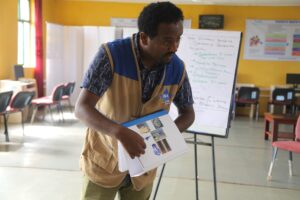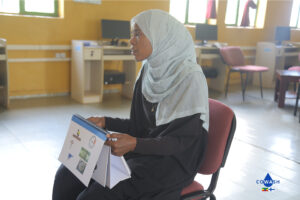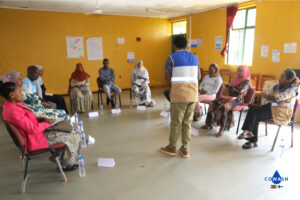The COWASH IV team is currently conducting a training program across seven project regions for volunteer Community Conversation Facilitators from local communities. This initiative is a major step forward in our efforts to bring positive behavioral change in sanitation and hygiene.
 The training program, which launched on September 16, 2025, in Gumaye, Jimma Zone, is designed to build the capacity of local volunteers and Woreda experts, including WASH savings and loan association (SLA) members and health extension workers. It aims to equip them with the skills to lead and facilitate effective, weekly or bi-weekly community conversations. To guide these interactive sessions, the COWASH IV team has developed a specially designed flip chart, now available in four local languages.
The training program, which launched on September 16, 2025, in Gumaye, Jimma Zone, is designed to build the capacity of local volunteers and Woreda experts, including WASH savings and loan association (SLA) members and health extension workers. It aims to equip them with the skills to lead and facilitate effective, weekly or bi-weekly community conversations. To guide these interactive sessions, the COWASH IV team has developed a specially designed flip chart, now available in four local languages.
Since its launch, the COWASH IV team has successfully conducted training in five Woredas in the Oromia and Sidama Regions. The team will continue this training in 18 additional Woredas in the coming weeks. A total of 230 volunteers will participate, and 92 community conversation groups will be formed to discuss crucial topics over eight consecutive sessions.
 These flip charts will guide discussions on essential topics including building and using improved latrines, alternative latrine products, hand washing, safe water handling and storage, menstrual health and hygiene, and gender and disability inclusion in WASH.
These flip charts will guide discussions on essential topics including building and using improved latrines, alternative latrine products, hand washing, safe water handling and storage, menstrual health and hygiene, and gender and disability inclusion in WASH.
This training program aims to foster in-depth, locally-led discussions that will lead to lasting behavior change. Halima Nasser, a WASH SLA member from Kersa Woreda in the Oromia region, shared that the training has significantly built her capacity, providing her with critical knowledge that she is now eager to share with her community. She emphasized that beyond providing the necessary information, the programme built her confidence and gave her the skills to deliver the training effectively.
 Abdulbasit Jemal, another trainee from Kersa Woreda, shared his enthusiasm, saying the training program is critical for both the trainees and the community. While his SLA group had already started social and behavioral change work, he noted that they were limited and lacked this kind of knowledge. He confirmed that with their gained skills, they will actively work to bring about change in their community.
Abdulbasit Jemal, another trainee from Kersa Woreda, shared his enthusiasm, saying the training program is critical for both the trainees and the community. While his SLA group had already started social and behavioral change work, he noted that they were limited and lacked this kind of knowledge. He confirmed that with their gained skills, they will actively work to bring about change in their community.
All participating volunteers were elected from the community based on the provided criteria for the Woredas. Ebsa Feyisa, Social and Behavioural Change specialist at COWASH IV, says success of the initial training is already evident applauding the volunteers for their active involvement and dedication to making a real difference in their communities.